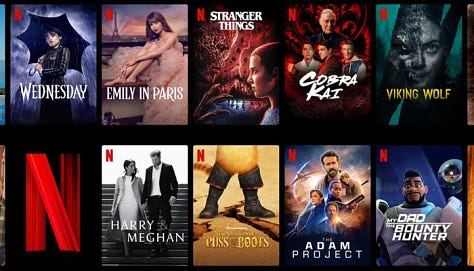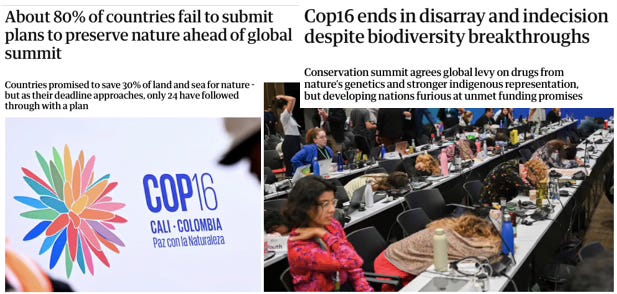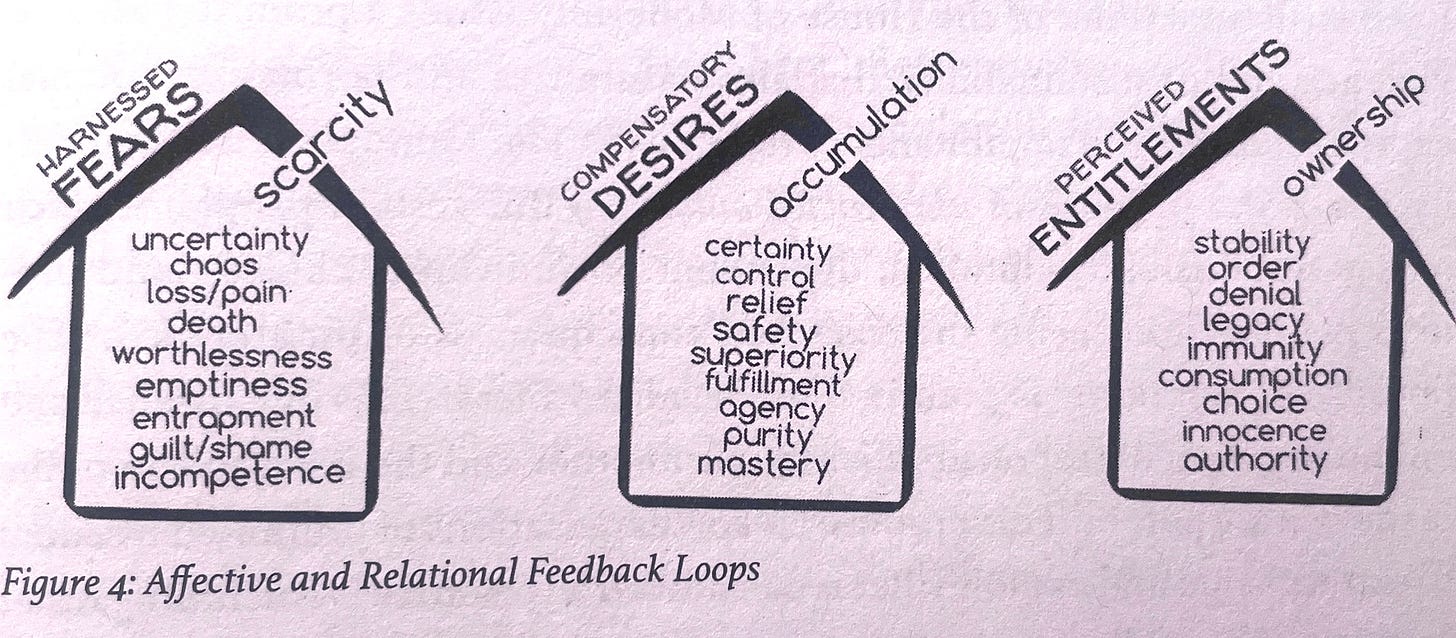Civilization-Centric Education and Media
The places that we turn for knowledge, from classrooms to screens, present us with information from an angle that emphasizes one (civilized) variety of one (human) species, and in an overall flattering light. They don’t encourage us to think too much about what side effects came along with planet-encircling empire or about the rising costs to maintain it. Cocooned in our homes, offices and vehicles, we hardly have to be aware -except when viewing the occasional headline or nature documentary- that we share this planet with other species, or that those beings’ activities are particularly significant, or that they’re enduring anything extraordinarily horrific. News stories cover isolated events and issues, which can make it seem that if only people are ambitious enough, we can solve them. Thus, most humans who are born into civilization are “ecology-blind” and “energy-blind”, lulled into a false sense of security, with an inaccurate understanding of our predicament and likely future.



photo source, source, source
Linear Progress Myth
The myth of progress can be defined (like here) as:
“the belief that human history moves forward and tends toward improvement. This is in contrast to much of the world’s indigenous cultures which understand history as moving cyclically or in multiple different directions simultaneously. The myth of progress denies the possibility that the future could be less shiny than the past, and it pathologizes those activists, scientists, and journalists ringing the alarm bells, as abnormal.”
Movies are scripted to provide satisfaction. The protagonist faces a seemingly insurmountable quandary, but they always outwit it. We’ve come to expect history to look like that. Civilizations may have imploded in the past, and although ours is imposing all the same environmental pressures at a larger-than-ever scale with nowhere left to run (or exploit), it’s somehow invincible, “too big to fail”. I notice, too, a sort of “frat boy hubris” about our ability to triumph despite irresponsible track record.

Narrow definitions of “success” and “sacrifice”
Members of human civilization suffer from a type of Stockholm syndrome. We’re raised to pursue all our needs and wants through civilization’s institutions. Academic and professional achievements don’t merely provide the basis for our identities and sense of belonging; they’re what we spend a large portion of our waking hours on, to earn access to food and shelter. Naturally, we want to “succeed” within this framework and the idea of “sacrificing” progress dismays us - and we feel the same about Civilization as a whole.
Meanwhile, we dismiss everything and everyone that Civilization has erased to access more and more of Earth’s calories, fuel and materials for its growing membership. We don’t realize that most of the big threats that we now face are the inevitable results of the activities that yield and perpetuate our “progress” and state of “development”.
If squirrels suddenly started doing what we're doing, at the same scale, to "exempt" themselves from having to experience life-on-Earth as all other species experience life-on-Earth, we would see them as a menace and recognize that their absurd quest was compromising the planet. If one race of humans were doing to another race what Human Civilization has done to other species as we spread across the world and insulate ourselves against earthly concerns, we’d denounce it as an atrocity. But we’re immersed in the society that’s doing it, so we don’t think to examine what produced and is maintaining our exceptional conditions, or to question whether is can persist. When it’s a question of survival, e.g. burning fossil fuels to transport food to Civilization-affiliated humans who live in an import-dependent region, we automatically apply a Civilization-first heuristic. Often we let ourselves believe that we’re the only ones here, and that our way of life is all there is and ever will be.
With the presumption of developed-ness as eternal and technological advancement as our main goal, it’s no wonder abandoning them feels like defeat. From a bully’s perspective, to stop bullying is to give up. The one thing we Civilization-affiliated humans refuse to consider is whether a return to “primitive” lifestyles (feasibility aside) would reverse all the worrisome trends. Instead, we keep asking how "5+9" can be made to "=2".
Amusingly, although most Civilization-affiliated humans dread a layoff, a demotion or having to survive indefinitely in the wilderness without Civilization’s supports (except when we imagine ourselves competing on Alone1). The stereotype of individuals who work lower-status jobs (especially if they’re “overqualified”) is that they must be unfulfilled or struggling with some challenge that prevents them from grinding harder for traditional markers of success. And if a person seriously makes weeds a major part of their diet, we think they’ve gone off the rails.

Specialization Silos, Techno-Idolatry and the Myth of Authority
A complex society creates specialists who operate in silos, as islands of expertise. Meanwhile, our busy lives and information overload make it easy to get caught up in specific debates. In both cases, people fail to see the forest through the trees. Generalists and systems thinkers who see the big picture and understand our predicament are rare.
Tom Murphy, “Metastatic Modernity #5: Our Biological Inheritance“:
“Evidence suggests that human brain size appears to have been larger 10,000 years ago than it is today, so that we might have lost capability compared to our prehistoric forebears. This fact is almost insulting to modern humans, thinking we’re so smart. But consider that an individual hunter-gatherer in a small group needed to comprehend far more about their world to thrive: cycles, rhythms, behaviors, patterns, associations, relationships, for instance. Modern humans have offloaded individual intellect into a rather impressive—but fragile—collective intelligence coded in temporary artificial constructs. Food comes from the grocery store, rather than from an intimate knowledge of seasons and signs.”
If doctors in Nazi camps could focus on striving toward narrowly-defined goals, then surely it takes little effort for us Civilization worker drones to compartmentalize - tapping at our keyboards in exchange for tokens, while blocking out signals about the context of our work. Someone can become consumed in following “green” energy’s technological design improvements, without questioning the knock-on effects of its environmental impact or whether Civilization can complete the mission as fossil fuel access wanes.
Ironically, our modernity-oriented culture advises young humans that coding expertise is their best bet for success in the future. As a species, we are investing in unpreparedness.
Civilization and advanced technology create an illusion of separateness and mastery, when really we’ve just been ignoring the increasing negative side effects, over which we have no control. We spend more time in front of screens than outdoors, so as far as we’re concerned, technology has consistently made things better, and so we put faith in engineering, even when physics and biology indicate that we shouldn’t.
Even as the polycrisis concept enters mainstream discourse, organizations from non-profits to consulting firms convey our predicament as a set a problems that humans can solve while preserving Civilization. We acknowledge the metacrisis and its roots often with the hope that this might be a step toward painlessly rewinding the damage, but such an option does not exist.

The myth of authority is “the assumption that those in positions of power know what they’re doing” (along with our tendency to trust that “someone will think of something”). For example:
UN’s Intergovernmental Panel on Climate Change trusts the International Energy Agency that efficiency will reduce emissions, when in fact is boosts them. This makes all their models reflect this factor as having an effect that is the inverse of the one it actually has, wrongly optimistic about technology’s impact on climate. (Sources/explanation in the Efficiency section here.)
The UN’s biannual World Population Prospects takes what it currently observes as a rule -humans who enjoy safe, comfortable lives choose to have fewer kids- and assumes that those circumstances will proliferate during the 21st century. This leads the UN to conclude that the human population will max-out around 2086, at 10.4 billion. Tom Murphy posted this assessment of some obvious flaws. The Limits the Growth study’s more comprehensive assessment likewise tells a different story.


"The myth of progress lifts the spirits as it numbs the brain"
-John Gray, “On the Silence of Animals”
Toxic Positivity
From Andrew Boyd’s “I Want a Better Catastrophe”:
“In America, there’s this very strong need to be hopeful and comfortable. You get the message early on that if you want to get ahead, don’t talk about the really dark stuff. If you want to have friends, don’t tell them how bleak it is.”
From Greer’s “Dark Age America”:
"Those who dare to use words such as ‘decline’ or ‘dark age’ can count on being taken to task by critics who insist earnestly that such language is too negative, that of course we're facing a shift to a different kind of society but it shouldn't be described in such disempowering terms, and so on through the whole vocabulary of the obligatory optimism that's so fashionable among the privileged these days."
Typically, if someone carefully assesses your plan and informs you that it’s strategically unsound, you would hear them out about why. But we're at a moment when the team or attitude with which your statements is associated is enough for society to dismiss you. Meanwhile, if a likely trajectory makes someone feel uncomfortable, they can latch onto denial, label their approach "optimism" and automatically become the favored party. Truth no longer matters. Those who call attention to Civilization-induced negative trends are just ungrateful. I notice, also, when someone describes a negative situation, others interpret it as a normative statement, an expression of endorsement - maybe because, for so long, there’s been little difference between what Civilization has wanted and what has been.
This is especially dangerous since, by skipping the daunting examination step, optimists are prone to demand programs that would deepen our crises. If a surgeon avoided reviewing your whole medical history because it made him feel too depressed, would you let him operate on you?
We Civilization-affiliated humans are in our current dominant position precisely because our predecessors didn’t back off. We got here by offloading the doom onto other species and other varieties of human society. Of course the only acceptable attitude is “We can do it!” And every day that we perpetuate our situation, we exacerbate ecological imbalance. When a serial killer refuses to surrender, it isn’t an admirable act of perseverance. An ecologically-aware citizen faces a Catch-22 between rooting for a genocidal, suicidal mission or rooting against their “home team”.

Pronatalism
You can’t have Civilization without population density! Coercion to reproduce goes beyond denial of birth control access. Many ecologically-unconcerned cultures apply pressure subtly through:
the myth that adulthood without kids feels incomplete and unfulfilling
the stigma against child-free adults - that they’re selfish, immature, dysfunctional
TV show portrayals that support the above - the default for “normal” adult characters is to have kids whereas the childfree characters are the weird neighbors or troubled workaholics
the taboo against expressing regret about the decision to be a parent
the standard by which it’s acceptable to chide childfree people and ask them why they don’t have kids, but it’s rude to ask a parent if they’re sure what they’ve done isn’t wrong
federal financial incentives for citizens to reproduce, thereby creating more laborers and consumers
Thailand (“The intention is to maximise the country's competitive advantage”) & China (2023)
France (2024)
Meanwhile, the USA’ss natalist movement is bringing back eugenics with a fashionable tech-hipster spin! (see The Guardian or Politico)

Modernity As Mental Block
A quote dump from Vanessa Machado de Oliveira’s “Hospicing Modernity”:
“Our visions of change are based on simplistic analyses and solutions, paternalistic relations with marginalized communities and ethnocentric ideals of justice, sustainability, and change. We underestimate the depth and complexity of problems, and we overestimate what information, policies, protocols, and enthusiasm can do. We also miscalculate the gap between where we are at and where we would like to be, and what we would need to relinquish to get there."
“Modernity itself conditions us to resist accepting its death… Modernity’s desires for universal formulas, consensual definitions, creative solutions, and hopeful futures can hijack our attempts to grapple with the complexities of its own dying.”
“This lack of incentive to face the world, along with a lack of preparedness to feel and not run away from difficult and painful things, contributes to a self-infantilizing pattern where we are conditioned to always seek more choices and entitlements, while firmly holding on to a safety blanket."
“If [modernity’s] promises are perceived to be unrealistic, many people will initially search for replacements mirroring the same expectations that the promises created. They will look for already articulated alternatives that can mimic the securities they desire —perhaps in the form of a different architecture that reorganizes the elements of the house, with perhaps different materials but upon the same foundations of separability."
“Whatever we imagine when we are still invested in modernity will always only be a different version of modernity that secures the entitlements and enjoyments modernity affords us now. Because these entitlements and enjoyments are based on violence and unsustainability, we are back to a circular pattern of systemic harm."


Public Performance, Private Candor
We’ve been born into captivity, with neither the territory nor the skills to seek sustenance independently. Instead, we need to play by the rules of the zoo. If we want to eat, we must perform the roles we’re paid to do and give the trainer and audience what they want, not necessarily what’s true. The most extreme opinion we can express, without jeopardizing our livelihood and friendships, is: “everything will be fine” to “climate change is a serious problem but it’s not too late to solve it”.
Meanwhile, consider these (admittedly anecdotal) accounts:
One article, “Many scientists don’t want to tell the truth about climate change”, reveals that “Scientists are shielding the public. They say: ‘We don’t want people to give up,’ or ‘We don’t want the island nations to feel abandoned.’”
“I meet with politicians, mayors, CEOs of Fortune 500 companies and over a few beers at dinner… they completely agree with these risks. ‘Yes, I see that. I see the relationship between money and energy. I see what we’re doing to the environment.’ And yet, when they have their job description of CEO or mayor or county planner or small business owner, they can’t see that risk because it’s not part of the institutional framework”
Gaya Herrington (bio) reveals:
“I have that experience as well, [with] people in tech and finance. But also, I live in Washington DC. People at the IMF and World Bank will tell you in private over lunch -and these are organizations that have growth in their mission statement- even they know it’s unsustainable. They just don’t know, necessarily, what the new narrative is and how to change that”
"The heads of global consulting firms, former heads of UN agencies, senior folks in the EU, amongst hundreds of others … have been getting in touch, privately, agreeing with my conclusions."
"Many private bankers I have spoken to believe that the current monetary systems will not last. They know the era of hegemony of the US dollar is coming to an end as oil purchases become far less significant to national economies in the coming years. [The USD enjoys special status because it’s used for 90% of international oil trade, but as declining oil extraction sets in, this will wane.] A smaller number also know about the environmental limits and economic contradictions of our expansionist monetary systems. Therefore, they anticipate a collapse and want to enable some options for their countries, institutions and elites to retain power within whatever monetary arrangements might take over."
Bendell notes that UN-affiliated scientists are under pressure "to produce findings that could be workable for policy makers". Their job is to suggest things that we could try, but they don’t actually need to be guaranteed to solve our problems and it doesn’t matter because we won’t do them anyway.
Will Martin (bio) during a presentation at Cornell about “Peak Oil and Peak Everything” mentions :
“I actually had a chat with the head of transportation for the World Bank, and he was talking about Peak Oil, and he talked about airlines for quite a while, saying that they’re essentially going to go bankrupt”
Vaclav Smil (bio), when asked “Can businessmen accept an end to growth? Have you mentioned this to Bill Gates?”, answers:
“I don’t need to tell him. He knows a lot about the environment. Put aside the billions of dollars and he is just a guy who likes to understand the world. He reads dozens of books every year. Like me.”
An affiliate of the Center for the Advancement of a Steady State Economy, writes about Climate Week:
“One developer of the original SDGs confided in me that he had ‘sympathy’ for the notion that GDP growth and environmental sustainability were not compatible.”
“The program director of ‘Net Zero and Sustainability’ at a major university agreed that GDP growth undermined environmental health”
this post, which at the bottom has SEVERAL podcast episodes about out dominant myths!
Tom Murphy’s “Are We Lucky?”, on our limited sense of “we” and “our” progress
blog post by Animist Ramblings, “Ghosts Without a Shrine”
Goodreads page, “The Myth of Progress: Toward a Sustainable Future” by Tom Wessels
Richard Heinberg on “The Allure of Cult Thinking”, including around “green” tech
A study on affluence and Identity
Anti-pro-natalist groups: Population Balance, Population Matters, and Population Media Center
Anti-natalist group: Stop Having Kids
Members of indigenous societies weren’t/aren’t alone. They would see our lifestyles as devastatingly isolated.




Oh boy, homework! Now I’ve got to clear some paths in my overgrown mental thickets. There was a bilious NY Times magazine interview last year, which showed him to be a get-off-my- lawn irrational crank, but you want specifics, understandably, so I’ll try to root around and get back here.
Great rundown of a running down civilization, basically unassailable in its points, so let me reiterate my familiar assail - the sourcing is a bit problematic. Smil/Gates are a corporatist tandem of crankdom and illogic, and need no attention. Hagens has nothing to say to his great friends the Fortune 500 CEOs - what can anyone say to them except thanks for nothing, folks?